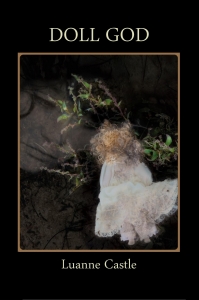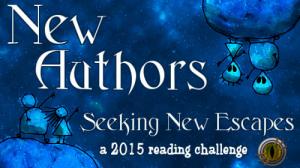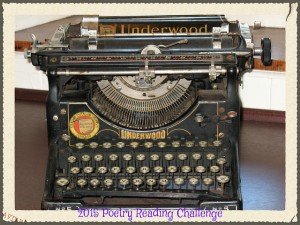 Although today is technically the end of National Poetry Month, my poetry reviews for #NPM15 will continue into May because I read way more books than I thought for the month, thanks to the Dewey 24-hour read-a-thon!
Although today is technically the end of National Poetry Month, my poetry reviews for #NPM15 will continue into May because I read way more books than I thought for the month, thanks to the Dewey 24-hour read-a-thon!
To wrap up this year’s National Poetry Month tour, I’ve got a great interview with Luanne Castle, author of Doll God (my review).
“This emotional collection will take a toll on its readers, but the journey will leave them changed in terms of perspective and renewed in that they will want to live more fully and enjoy each moment in the moment.” — Savvy Verse & Wit
Please give her a warm welcome.
 1. Re-examining our childhood and our pasts is something that echoes throughout your collection, Doll God, and there is a deep sense of anxiety and loss tied to those reflections. When did you first start examining your own childhood and past and how does anxiety and loss tie into that self-examination?
1. Re-examining our childhood and our pasts is something that echoes throughout your collection, Doll God, and there is a deep sense of anxiety and loss tied to those reflections. When did you first start examining your own childhood and past and how does anxiety and loss tie into that self-examination?
My childhood has always loomed over me, both for its anxieties and its imaginative qualities. I also write and have published prose based on my childhood experiences. When I was a little girl my father built a bomb shelter in our basement. We were in the middle of the Cold War, and there was fear and tension in our lives because we thought “The Bomb” could drop at any moment. So childhood has always crept into my poetry, although I didn’t start to examine it with purpose until about 6 or 7 years ago, which is when I began to spend more time writing.
2. Dolls are prevalent throughout the collection. Do you think dolls still play a pivotal role in young girl’s lives? And how do you think their role has changes with the evolution of technology?
Dolls are still important to society–and to many young girls. When I was a kid not all girls preferred dolls to other toys, and that is still true. Even I had as much fun with my cement mixer and “army men” as I did with my dolls at certain periods in my life. Actually, army men are really dolls, now that I think about it! But dolls have stayed close to the essence of my childhood. Boys also were given dolls when I was a kid. We were probably the first generation where boys like my brother were given G.I. Joe dolls. My brother had Chatty Cathy’s baby brother with a sweater and cap knitted by my grandmother. Since then, so many different dolls and doll-like figurines have been created for both boys and girls.
Technology has slightly altered the doll-scape in two ways. We have many “throwaway dolls.” By that I mean that the discretionary income and low-cost overseas production has created an abundance of dolls found on the shelves of Target, Wal-Mart, and Toys R Us. Dolls are often $5-10 birthday presents for girls. Too many Barbies? Lose one at the grocery store, pull off the head of another. For many fortunate children, there will always be another Barbie. The other way technology has affected the doll industry is that dolls are produced to capitalize on the popularity of movies, television shows, and computer games. While this trend started 100 years ago, it has grown as technology has grown. Now a huge portion of dolls at the major store chains are related to these technologies.
3. How much of your poetry is autobiographical? How far does it stray from your own life? In other words, where is the line between fact and fiction?
Sometimes a poem starts out autobiographical and strays into the fictional without me even realizing it. Other times a poem might begin as fiction, but by the time it’s completed, it has incorporated a lot of elements from my own life experiences. A reader would be hard pressed to find the “line” between the two in my work. And I think that is as it should be–to read poetry as confessional is dangerous and limits the reader, the poem, and the poet.
4. Do you still collect dolls? How many are or were in your collection?
I didn’t begin an actual doll collection until my daughter grew out of her dolls. When she was no longer interested in them, I became fascinated and still have all of hers. As a child I had baby dolls, but that was because once I was given a doll I didn’t lose it or abuse it, so over time I had a fair number. But never a collection. We didn’t have the money for that. I didn’t even own a real Barbie. My Barbie was a Miss Suzette by Uneeda. But I did have a Ken doll and a beautiful toddler-sized walking doll who may or may not have ended up in Doll God. My husband and I love antiquing and in the past ten years I’ve accumulated quite a few dolls. I have a decent collection of Asian dolls, including Japanese hakatas. I also collect Magic Attic Club, Madame Alexander, cowboy and cowgirl, Red Riding Hood, literary, and Broadway musicals.
5. Writing is a solitary endeavor for many authors. How do you maintain contact with the outside, and how does that differ from the experience of reading your work aloud for an audience?
I maintain contact by connecting with my writing peeps, both in person and through email and phone calls. Then blogging and social media are other ways I feel a part of the outside world. These are important for social reasons, but also for educational purposes. I learn a lot from my fellow writers.
I am not fond of being in large groups of people, but I do enjoy the act of reading my poetry, which is a performative experience. I recently was interviewed on a morning television show and was asked to read one of my poems. That was fun. I have also been known to read to rescue kitties at the shelter once a week. In the past I’ve read my poetry at various events, but since Doll God was published, I haven’t been able to read publicly. I hope to change that in the near future.
6. Doll God is your first collection. How long have you been writing poetry, and how long did it take you to create your first collection? Are you planning a second?
I first wrote poetry when I was in about 5th grade. My first poem rhymed and was about an old woman in a rocking chair. Chair is a good rhyming word. I took up writing poetry again in high school and wrote very melancholy poems. I turned in a poem for an English class assignment and received a B+ on it–my lowest English grade. That’s when I decided that teachers shouldn’t really be putting letter grades on students’ creative writing attempts. I have a whole philosophy about the teaching of poetry.
When I started college I was encouraged to look ahead to getting a job, so I set poetry aside until my husband and I adopted our first child from Korea. I wrote a poem about picking him up at the airport and the floodgates opened. Soon after, I applied to the MFA in creative writing program at our local university and began studying writing in earnest.
My current project involves “genealogy poems” based on research I’ve done on female ancestors. I’d like to create a chapbook from these poems.
Thank you so much for hosting me, Serena. I loved that Doll God could be part of your book tour. These questions were great fun and really made me think in ways I haven’t before.

 About the Poet:
About the Poet:









